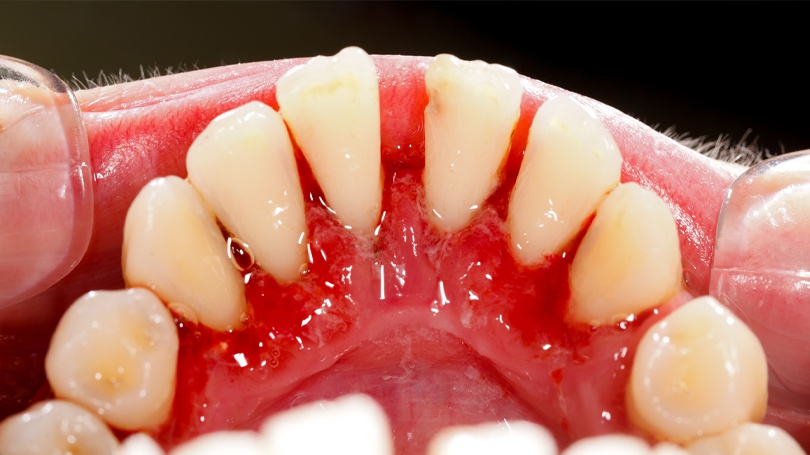What Causes Receding Gums and How to Treat Them

Receding gums can be quite uncomfortable. Many people do not perform self-examinations and only visit their dentists when something is clearly wrong. It is not unusual for people to first realize their gums are receding because they feel pain and inspect the area in a mirror. If you are experiencing receding gums, the good news is that the condition can almost always be treated. In many cases, you can even reverse the recession with at-home care, but you should definitely schedule a dental checkup.
What Is Gum Recession?
Gingival recession is the loss of the soft tissue known as your gums. As tissue is lost, the margin between the gumline and crown grows, and the tooth root eventually becomes exposed. Gum recession is problematic because it makes the tooth more prone to decay as well as damage.
What Causes Receding Gums?
The common causes of gingival recession are:
- Genetics – Some people have a genetic predisposition to gingival recession. Research suggests that more than 30 percent of the population is predisposed to gum disease, and gum recession is often a symptom of that. If your parents have dealt with such issues, then this is a potential you should definitely keep an eye on.
- Tooth crowding – Many people are born with teeth that are overcrowded and other tooth positioning issues that make them more susceptible to gum recession. Such positioning issues can usually be noticed early and corrected prior to the gum recession and other symptoms manifesting.
- Bruxism – Bruxism is the technical term for grinding and clenching your teeth. The most common type is nocturnal bruxism, which occurs while you sleep. Many people affected by nocturnal bruxism are unaware of their condition, and left untreated, it can lead to many oral health complications, including gum recession. If the bruxism is treated with a custom-fit night guard, the gum recession will often reverse on its own.
- Gum tissue trauma – Trauma to the gum tissue itself or a nearby tooth can cause the gums to recede. Such traumatic injuries can occur during automobile accidents, while playing sports, or through slip and falls.
- Poor oral health – The most common cause of gum recession is gingivitis, which is the earliest stage and most prevalent form of gum disease. Gum disease usually occurs due to the buildup of plaque and tartar.
- Aggressive brushing and flossing – Even people dedicated to oral health can cause gum recession by being overzealous. The American Dental Association recommends a soft-bristled brush and gentle brushing. You should not be scrubbing your teeth and gums, and routine oral care should never cause you discomfort.
Treatments for Gingival Recession
The good news is that no matter the cause of your gum recession, it can be reversed. If you have diagnosed your receding gums yourself and caught the condition early, you may be able to correct it at home. It is still recommended that you consult with your dentist, who can help determine the underlying cause and recommend a course of action. In the meantime, consider switching to a toothbrush with softer bristles, and reevaluate how you brush and floss to determine if you are the cause.
In the event you need treatment, your dentist may make the evaluation or coordinate with a periodontist depending on his or her specialties. Often, your dentist will make recommendations concerning your lifestyle and oral hygiene regimen as well as provide you a new toothbrush and special instructions. If your gum recession is due to periodontitis—a more advanced form of gum disease—your dentist may recommend scaling and root planing, which provides a deep clean.
In particularly serious cases, it may be necessary to have surgery performed. Dental surgeons perform a procedure called a gum graft, which probably sounds worse than it is. There are several different types of gum grafts, but the most common involves grafting tissue from the roof of the mouth to the gums. It is also becoming more common to use tissue from a tissue bank rather than from your own mouth.
Good Oral Health
Most gum recession can be avoided through good oral hygiene. That starts with brushing and flossing at home on a consistent basis. You also need to see your dentist for preventative reasons. Your dentist will clean your teeth and perform a complete checkup. Do this, and you will generally deal with any oral health issues before they manifest into gum recession or another problem.
Reverse Your Receding Gums
Learning that you have receding gums can be disheartening and even scary. The good news is that you have options and can achieve excellent oral health once again. Jeffrey D. Clark, DDS, is a foremost dentist in Scottsdale who has considerable experience helping his patients enjoy healthy gums throughout their lives. Come to Scottsdale Cosmetic Dentistry Excellence to have your teeth cleaned and your overall oral health assessed. Call us today at 480 585 1853.




